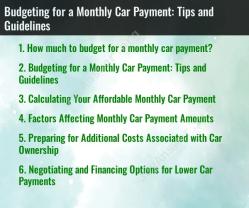How to monthly budget?
Creating a monthly budget is an essential part of effective financial planning. It helps you track your income, expenses, and savings, enabling you to manage your money more effectively and achieve your financial goals. Here's a step-by-step guide on how to create a monthly budget:
1. Gather Your Financial Information:Collect all relevant financial documents, including pay stubs, bank statements, bills, and receipts. Having a clear picture of your income and expenses is crucial.
2. List Your Income:Make a list of all your sources of income for the month. This includes your salary, wages, rental income, side hustle earnings, and any other sources of income. Write down the exact amounts you expect to receive.
3. List Your Expenses:Create a comprehensive list of all your monthly expenses. Categorize your expenses into fixed and variable categories:
Fixed Expenses: These are consistent and typically non-negotiable expenses, such as rent/mortgage, utilities, insurance, loan payments, and subscriptions.
Variable Expenses: These are flexible and can vary from month to month. Examples include groceries, dining out, entertainment, and transportation.
Periodic or Annual Expenses: Don't forget to include expenses that may not occur every month, such as annual subscriptions, car maintenance, or taxes. To account for these, divide the annual cost by 12 to determine the monthly budget amount.
4. Set Financial Goals:Identify your financial goals. These could include saving for an emergency fund, paying off debt, saving for a vacation, or investing for retirement. Prioritize these goals to allocate funds accordingly.
5. Calculate Your Total Income and Expenses:Add up your total monthly income and total monthly expenses. This will give you a clear overview of your financial situation.
6. Create a Budget:Subtract your total expenses from your total income to determine whether you have a surplus or a deficit. If you have a surplus, allocate the extra funds to savings or debt repayment. If you have a deficit, you may need to adjust your spending or find ways to increase your income.
7. Adjust and Prioritize:Review your budget regularly to track your progress. Adjust it as needed to ensure you're staying on track with your financial goals. Prioritize essential expenses like bills and savings before allocating funds to discretionary spending.
8. Use Budgeting Tools:Consider using budgeting software or apps to help you track and manage your budget more easily. Many of these tools can automate expense tracking and provide valuable insights into your spending patterns.
9. Monitor and Track Expenses:Keep all receipts and monitor your spending regularly. This helps you identify areas where you might be overspending or areas where you can cut back.
10. Build Emergency Savings:As part of your budget, prioritize building an emergency fund to cover unexpected expenses. Experts recommend having three to six months' worth of living expenses saved.
11. Pay Down Debt:If you have outstanding debts, allocate extra funds to pay them down. This will reduce interest costs and improve your financial stability.
12. Be Realistic and Flexible:Your budget should reflect your actual spending patterns and financial goals. Be realistic about your needs and be prepared to adjust your budget as circumstances change.
13. Stay Committed:Consistency is key. Staying committed to your budget and financial goals over time will yield positive results and help you achieve financial security.
Creating a monthly budget is a valuable financial skill that can provide peace of mind and help you achieve your financial aspirations. It's an ongoing process, and the more you practice, the more in control of your finances you'll become.
How to Create a Monthly Budget: Step-by-Step Guide
To create a monthly budget, follow these steps:
- Gather your financial information. This includes your income from all sources, such as your paycheck, investment income, and rental income. It also includes your expenses from all sources, such as housing, food, transportation, and debt payments.
- Calculate your net income. This is your total income minus taxes and other mandatory deductions.
- Categorize your expenses. This will help you to see where your money is going each month. Common expense categories include housing, food, transportation, utilities, debt payments, savings, and personal expenses.
- Set spending limits for each category. This is where you decide how much money you want to spend on each category each month. Be realistic and make sure that your spending limits are less than your net income.
- Track your spending. This will help you to stay on track with your budget. You can track your spending manually or use a budgeting app or software.
- Review your budget regularly. This will help you to identify any areas where you can cut back on spending or increase your savings.
What Are the Key Components of a Successful Monthly Budget?
A successful monthly budget should be:
- Realistic: Your budget should be based on your actual income and expenses. Don't try to budget more money than you have coming in.
- Comprehensive: Your budget should include all of your income and expenses, even the small ones.
- Flexible: Your budget should be flexible enough to accommodate unexpected expenses.
- Trackable: You should be able to track your spending so that you can stay on track with your budget.
- Reviewable: You should review your budget regularly to make sure that it is still working for you.
Tips for Managing and Sticking to Your Monthly Budget
Here are some tips for managing and sticking to your monthly budget:
- Set financial goals. What do you want to achieve with your budget? Do you want to save for a down payment on a house? Pay off debt? Retire early? Having specific financial goals will help you to stay motivated to stick to your budget.
- Make a plan. How will you reach your financial goals? Your plan might involve cutting back on unnecessary expenses, increasing your income, or investing your money.
- Automate your savings. Set up automatic transfers from your checking account to your savings account each month. This way, you will save money without even having to think about it.
- Be accountable. Tell a friend or family member about your budget and ask them to hold you accountable for sticking to it.
- Review your budget regularly. Your financial situation can change over time, so it is important to review your budget regularly and make adjustments as needed.
Sticking to a budget can be challenging, but it is worth it in the long run. By following these tips, you can manage your money more effectively and reach your financial goals.













